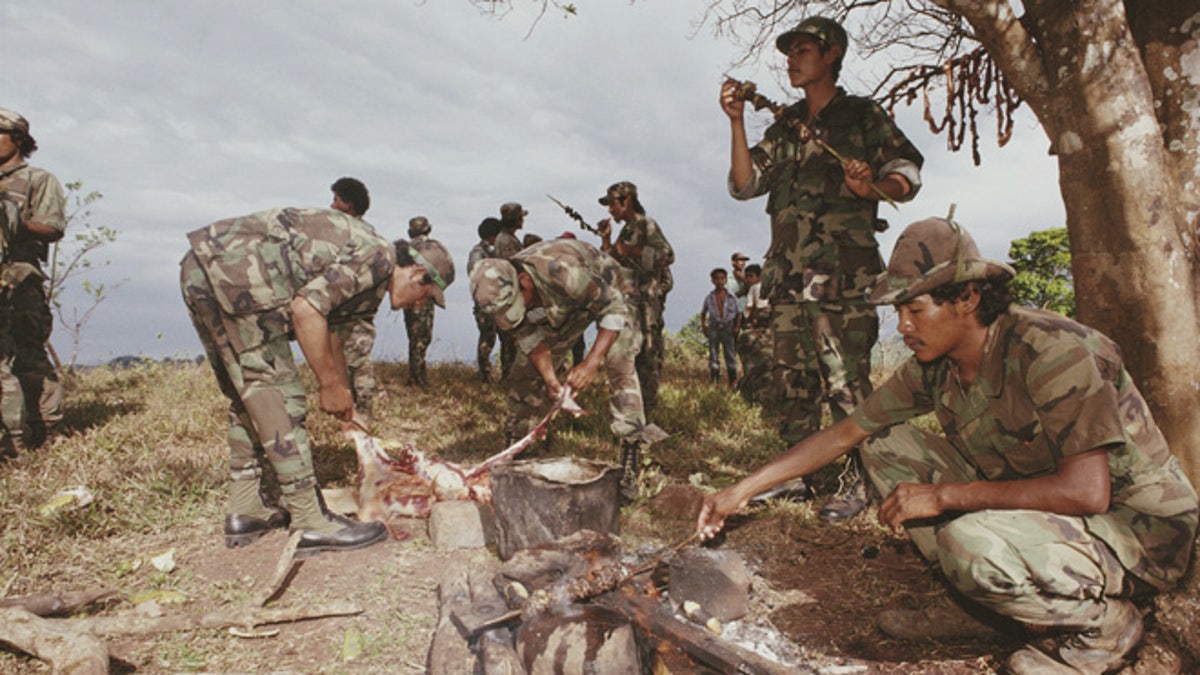
A group of contra guerillas cooking food in a disarmament zone, which they have just entered, Nicaragua, 1990. (Photo by Scott Wallace/Getty Images)
It’s been almost 30 years since the Iran-contra scandal, but for some in the Nicaraguan highlands the war has never ended.
Rebel fighters in the Central American nation’s forested mountains are once again setting up ambushes against the government, getting into firefights with the military and hoping to overthrow President Daniel Ortega’s administration just like they did in the 1980s.
The contras, also referred to as “the rearmed,” may be a shadow of their former fighting force – they have little money and bemoan the lack of international funding a la the Reagan administration – but the rebels are still causing havoc in a country that is becoming increasingly more politically divided. Just last week a skirmish with the contras left a number of soldiers, police officers and civilians dead.
The war between the Nicaraguan government and the contras officially ended over 25 years ago when Ortega was voted out of office. But Ortega ran for president again and won back his seat in 2006, ushering in economic and social reforms that have boosted his popularity with the poor and working class, but also angering many who condemn his control over everything from the elections to the police to the courts.
There is also widespread anger over the political favors granted to Ortega’s family and friends that have turned many into millionaires. Ortega’s friends and family now own fuel companies and television stations and some people are comparing him to the dictator he helped overthrow, Antonio Somoza.
“Daniel Ortega wasn’t anything, and now he owns half of Nicaragua,” a contra fighter named Tyson told the New York Times.
It’s not just the contras, however, who are upset with the Ortega government. Student activists, opposition lawmakers and other protestors are speaking about the apparent corruption and graft taking place in Nicaragua.
“It’s a legitimate social cause,” Gonzalo Carrión, the director of the Nicaraguan Center for Human Rights, told the Times.
Despite the deadly attacks and skirmishes, the Nicaraguan government has so far steadfastly refused to acknowledge that the contras have reemerged from the highlands.
“There are no armed groups in this country,” Julio César Avilés, the army chief, said last year. “I have said it on multiple occasions.”
Human rights groups, however, say that the Nicaraguan government is waging a covert assassination campaign against the contras.
Last year, one rebel was ambushed and killed inside his house, while two more died when a backpack delivered to them by a courier exploded. In 2011, the most notorious contra leader was shot to death and his successor’s bullet-riddled body was found later that year in a ditch in neighboring Honduras.
While many of the contras have vowed to keep fighting – one posted a video to Facebook promising that 45 different groups will attack state institutions until Ortega holds fair elections – others admit that their fight is difficult as their numbers and money dwindle.
“There are not so many fighters, because they are killing them,” Rafael Antonio Lanzas, a contra rebel told the Times.
Another problem facing the contras is the difficulty of winning over the hearts and minds of the country’s poor. Nicaragua is the second poorest nation in the Western hemisphere, behind Haiti, and the Ortega government has a loyal following among the impoverished thanks to programs like Houses for the People, which distributes houses to the poor at discount prices.
Still the rebels say that the Nicaraguan people are getting a raw deal as Ortega and his friends continue to amass personal fortunes.
“Nobody goes to war because they like it,” Tyson said. “The Nicaraguan people are getting robbed.”
